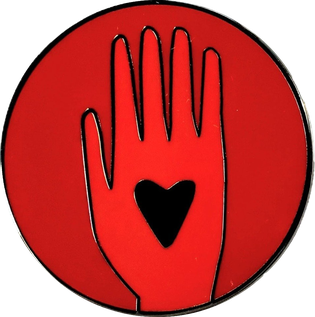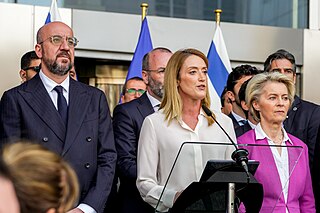
Israel–New Zealand relations are the foreign relations between the State of Israel and New Zealand. While Israel has an embassy in Wellington, New Zealand's embassy in Ankara, Turkey is accredited to Israel. Diplomatic relations between the two countries date back to January 1949. New Zealand has exported a mixture of agricultural and manufactured goods to Israel. In return, Israel has exported a range of manufactured goods to New Zealand. Bilateral relations between the two countries have been complicated by issues such as the 2004 Israel–New Zealand passport scandal, United Nations Security Council Resolution 2334, and the Israel-Palestine conflict.

The bilateral relations between the State of Palestine and Russia have a complex history, deeply interwoven with Russian and Soviet relations with the Israeli enterprise, Palestinian nationalism, and Third World national liberation movements. Between 1956 and 1990, Soviet–Palestinian relations were part of the then-ongoing Soviet–American confrontation.

The 2014 Gaza War, also known as Operation Protective Edge, and Battle of the Withered Grain, was a military operation launched by Israel on 8 July 2014 in the Gaza Strip, a Palestinian territory that has been governed by Hamas since 2007. Following the kidnapping and murder of three Israeli teenagers in the West Bank by Hamas-affiliated Palestinian militants, the Israel Defense Forces (IDF) initiated Operation Brother's Keeper, in which it killed 10 Palestinians, injured 130 and imprisoned more than 600. Hamas reportedly did not retaliate but resumed rocket attacks on Israel more than two weeks later, following the killing of one of its militants by an Israeli airstrike on 29 June. This escalation triggered a seven-week-long conflict between the two sides, one of the deadliest outbreaks of open conflict between Israel and the Palestinians in decades. The war resulted in over two thousand deaths, the vast majority of which were Gazan Palestinians. This includes a total of six Israeli civilians who were killed as a result of the conflict.

Reactions to the 2014 Gaza War came from around the world.

Following the 2023 Hamas-led attack on Israel and outbreak of the Israel–Hamas war, the United States began to send warships and military aircraft into the Eastern Mediterranean and began sending Israel more military supplies. The Joe Biden administration stated that Israel would receive "whatever it needs" to support its offensive against the Hamas-ruled Gaza Strip.
The year 2023 in Israel was defined first by wide-scale protests against a proposed judicial reform, and then by the Hamas-led attack on Israel on October 7, which led to a war and to Israel invading the Gaza Strip.
Events in the year 2023 in Palestine.
On 7 October 2023, a large escalation of the Gaza–Israel conflict began with a coordinated offensive by multiple Palestinian militant groups against Israel. A number of countries, including many of Israel's Western allies, such as the United States and a number of European countries, condemned the attacks by Hamas, expressed solidarity for Israel and stated that Israel has a right to defend itself from armed attacks, while countries of the Muslim world have expressed support for the Palestinians, blaming the Israeli occupation of the Palestinian territories as being the root cause for the escalation of violence. The events prompted several world leaders to announce their intention to visit Israel, including US President Joe Biden, French President Emmanuel Macron, German Chancellor Olaf Scholz, and British Prime Minister Rishi Sunak.

United Nations General Assembly Resolution ES-10/21 is a resolution of the tenth emergency special session of the United Nations General Assembly relating to the Israel–Hamas war.
The Israel–Hamas war sparked a major diplomatic crisis, with many countries around the world reacting strongly to the conflict that affected the momentum of regional relations. At least nine countries took the drastic step of recalling their ambassadors or cutting diplomatic ties with Israel. The conflict has also resulted in a renewed focus on a two-state solution to the ongoing conflict.
A temporary ceasefire between Israel and Hamas-led Palestinian militant groups in the Gaza Strip took effect from 24 November 2023 to 30 November 2023, during the Israel–Hamas war.

United Nations General Assembly Resolution ES-10/22 is a resolution of the tenth emergency special session of the United Nations General Assembly calling for an immediate ceasefire in the Israel–Hamas war, "immediate and unconditional" hostage release, "ensuring humanitarian access" and that "all parties comply with their obligations under international law".

Artists4Ceasefire is a collective of actors, filmmakers, and other artists calling for an immediate and permanent ceasefire during the Israel–Hamas war in Gaza, the delivery of humanitarian aid to civilians, and the release of all hostages. The collective was started on October 20, 2023, two weeks after the October 7 attacks.
Numerous municipalities and other local bodies in the United States have passed resolutions urging a ceasefire in the Israel–Hamas war. Resolutions are generally modeled after the Ceasefire Now resolution, introduced in the US Congress by Cori Bush, which also called for release of the hostages. At least 20 cities condemned the 2023 Hamas-led attack on Israel. Seventy cities had passed resolutions by the end of January 2024. As of March 2024, resolutions have passed in over 100 localities, including the major cities of Atlanta, Chicago, Dayton, Detroit, Minneapolis, Providence, Sacramento, Seattle, St. Paul, St. Louis, San Francisco, and Toledo.

United Nations Security Council Resolution 2728, adopted on 25 March 2024, demands an immediate ceasefire in the Israel–Hamas war during the month of Ramadan leading to a lasting sustainable ceasefire. It also demands the unconditional release of all hostages. The resolution received approval from 14 members, while the United States abstained from voting.

The Israel–Hamas war has had significant effects on some major European Union member countries and institutions.

Following the outbreak of the Israel–Hamas war on 7 October 2023, the United Kingdom has provided Israel with extensive military and diplomatic support. In response to the 7 October attacks, British Prime Minister Rishi Sunak asserted that the United Kingdom "unequivocally" stands with Israel. The UK also issued an "unequivocal condemnation" of Palestinian militant group Hamas and deployed British Armed Forces personnel and assets to the Eastern Mediterranean to support Israel.

The three-phase Israel–Hamas war ceasefire proposal is a proposed prisoner exchange and armistice proposal to end the Israel–Hamas war. The deal was drafted by mediators from Egypt and Qatar on May 5, 2024, and endorsed by Hamas on May 6, 2024. On May 31, 2024, U.S. president Joe Biden presented the deal, incorrectly stating it was an Israeli proposal; the proposals are nearly identical. The proposal is a serial initiative in three stages, beginning with a six-week ceasefire, the release of all Israelis being held in Gaza in exchange for some Palestinian detainees, a permanent ceasefire, Israel's withdrawal from Gaza, and a reconstruction process lasting from three to five years.

United Nations Security Council Resolution 2735, adopted on 10 June 2024, calls on Hamas to accept a proposed hostage and ceasefire agreement in the ongoing Israel–Hamas war. The resolution, presented by the United States, details the three-phase proposal and notes Israel's acceptance thereof. The implementation of the described agreement would result in the release of all hostages held by Hamas, establish a permanent ceasefire in the Gaza Strip and advance a multi-year reconstruction plan. Additionally, the resolution rejects any demographic or territorial changes in the Gaza Strip and reaffirms the Security Council's support for a two-state solution, envisioning the unification of the Gaza Strip and the West Bank under Palestinian Authority governance.
Events in the year 2024 in the United Nations.














